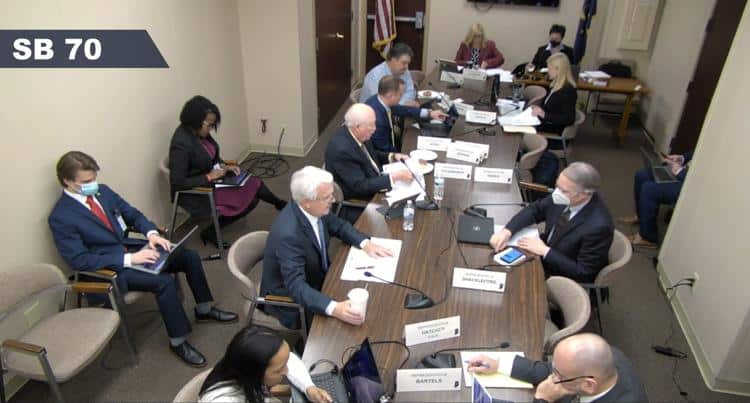
Across the state, Hoosiers’ news feeds are filled with everything that’s happening in their backyards. But what about the things that aren’t happening?
Tuesday was the last chance for Senate bills to be passed through House committees, leaving many short of final passage. Committee meetings are the public’s only chance to testify on legislation. For legislators, it’s a time to analyze and tweak bills to get them ready for presentation to the full General Assembly.
Here’s a recap of some of the bills that didn’t quite make the cut.
Senate Bill 6—This bill would have required that bail for “violent arrestees” be paid by the arrestee or close relative rather than a nonprofit organization or other third party without close ties to the person in question. The bill made it all the way through the Senate and was later assigned to the House Courts and Criminal Code Committee (above), where it stalled.
Senate Bill 14—It didn’t make it out of the Senate Judiciary Committee, which was its very first stop. It would have changed the law so that only people between 18 and 21 would need a license to carry a handgun, with certain exemptions for those over 21. Its counterpart, House Bill 1077, takes the notion a bit further by aiming to remove the permit requirement altogether for law-abiding Hoosier handgun owners. It might squeeze through before Thursday’s Senate committee deadline after it’s heard in the Senate Judiciary Committee Wednesday afternoon.
Senate Bill 17—This bill’s goal was to set penalties for “harmful” material that could potentially be held in schools or public libraries, but it didn’t make it past its hearing in the House Education Committee.
Senate Bill 31—If it had advanced beyond its initial committee and survived the long haul, it would have prohibited employers from requiring a COVID-19 shot for an employee if it would jeopardize the employee’s health. It also would have opened an employer who disregarded the law up to a lawsuit. Its companion in the other chamber, House Bill 1001, has garnered more attention and is headed to the Senate floor. It differs from SB 31 because it would allow employees to opt out of the immunization if they agree to submit negative test results or cite a religious reason to abstain.
Senate Bill 221—The bill would have permitted any qualified voter to complete an absentee ballot; however, the bill has taken a permanent vacation from the General Assembly—just like the recently retired author Sen. Frank Mrvan, D-Hammond. While Mrvan received a standing ovation for his decades of service, this particular bill died with a whimper.
Senate Bill 399—Under this bill, minors seeking an abortion would have needed consent from a parent or legal guardian. For those minors who refused to comply, it would have authorized an evaluation of whether the young person was mature enough to make the decision on their own. It didn’t make it out of its first committee.
Senate Bill 414—It would have allowed the lawful production and sale of marijuana, but no action was taken. In fact, none of the cannabis bills this session got a hearing.
The life of a bill is rough and regimented. Even when a bill passes through its second committee, its sponsors are still subject to meeting deadlines in the Senate or House chamber. Even if all deadlines are met, the Speaker of the House or Senate Pro Tempore can decide not to put a bill on the chamber’s calendar.
Thursday is the deadline for House bills to pass through Senate committees.
The good news for people who support deceased bills is that there is sometimes a chance of resurrection in a different form. Ideas or entire passages from dead bills can be added as an amendment to healthy bills that are somewhat germane to the dead bill’s original topic.
In other cases, the bill can reappear the following year.
Sen. Jean Leising, R-Oldenburg, tried to pass a bill to mandate cursive instruction in primary schools for seven consecutive years.
A dead bill isn’t always dead.
Isaac Gleitz is a reporter for TheStatehouseFile.com, a news website powered by Franklin College journalism students.